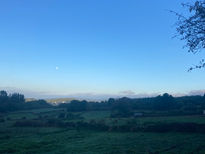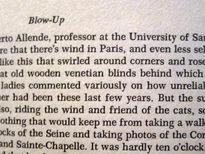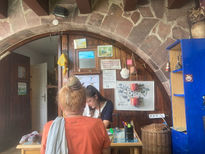- Nov 13, 2022
- 11 min read
Updated: Feb 2, 2023
A Love-Letter to Deborah Levy, Cheryl Strayed, Kate Christensen, Pearl Cleage, Anaïs Nin and, of course, Marguerite Duras

I am rereading the living autobiographies of Deborah Levy that I read in the jungle, on my mother’s hand-me-down iPad that’s so old it won’t open Google Drive, let alone install Netflix, or Pocket, or the app for The New York Times that I subscribed to precisely so I’d be able to stay in touch even as I headed deep into the Amazon rainforest.

I try any of these things and it starts crying and squirming and hitting the table with its tiny digital fists. But it lets me use the Books app (or “iBooks,” as it’s still called on my iOS from 1983) and so read digital, sterile, unromantic versions of Deborah Levy I did, at an ayahuasca centre outside Iquitos, Peru, where I was working with my then-boyfriend back in January this year. I did this even though the place was filled with sexy, yellowing paper versions of much more relevant titles like The Tibetan Book of the Dead and How to Change Your Mind and The Cosmic Serpent.
These books were yellowing and also curled-up like a bleeding woman without Ibuprofen due to the constant rains and tropical temperatures; a classic one-two punch to electronics everywhere that had already knocked my state-of-the-art, M1-chip MacBook Air (bought brand new only six months earlier) flat on its back. “Condensation” the tech support forums I could still access on my boyfriend’s laptop had informed me, as I stared through tears at the pitch-black screen of mine. We’d been in the jungle not two weeks, and the tool I’d justified the trip by saying I’d write about it on was perhaps not dead, but certainly unconscious. Our local village offered sun-warmed glass bottles of Coca-Cola, pre-rolled rustic tobacco cigarettes, fresh macambo beans and great bundles of plantain in various stages of ripening. Alas, no Apple Store.
All this is to say that I really should not have been using my already hanging-on-by-a-thread iPad to read flat, non-sensuous renditions of a writer’s life in grey London when I was in a hot and humid jungle that wanted to kill all my electronics, and which I also ought to be learning more about by reading the ample medicine literature found on its bookshelves.
But of course, I did. Because Deborah Levy’s renditions of a writer’s life in grey London were only flat and non-sensuous in terms of their physical representation. Actually reading them I was sucked in, transported away from my hammock beneath an açai tree and its soundtrack of buzzing cicadas, croaking toucans and gently snoozing jungle dogs all the way to Deborah’s post-divorce (and judging by it’s description, only just pre-apocalyptic) high-rise flat on top of a Camden hill.
Yes, this was something I wanted. Go figure.
Granted, I was going through some stuff. I had probably drunk forty cups of ayahuasca since coming to South America three months earlier. Us medicine peeps like to say drinking ayahuasca is “like having ten years of therapy in one night.” So yes, I had some things to think about.
And finding Deborah Levy… I don’t know why, but it was like finding air. I had not felt so at home in a writer since my friend Oliver lent me the accidental by Ali Smith, or my other friend Cattis (see I have two) lent me Crème Fraîche by Suzanne Brögger when I was nineteen.
the accidental is fiction, but Crème Fraîche is memoir. Just like Things I Don’t Want to Know, The Cost of Living, and Real Estate.
I fucking love memoir. So Sad Today, Wild, Educated, everything ever written by Chelsea Handler.
I always thought you had to be already famous to write a memoir. But maybe, you just need to be self-absorbed? Of course, having been through something epic and unusual helps, like Cheryl Strayed in Wild and Tara Westover in Educated. And Melissa Broder was famous from her Twitter when she published her book of personal essays. Deborah Levy wrote a ton of fiction and plays before writing her autobiographies, and so, although her life reads as completely ordinary, it is not. She is a famous writer. Her life, therefore, is of interest, for example to the many non-famous writers who would one day like to be famous writers. I hear there’s a few of us.
And yet. What I love about her books, and the essays of Melissa Broder, and the majority of stretches from Educated, Wild and Chelsea Handler’s books as well, is not the stuff that makes them unusual.
It’s the stuff we all have in common. Like lugging groceries up a hill, pretending not to be freaked out by a hot guy checking us out in a bar, or wondering whether we are, in general, being unbearably embarrassing or just paranoid.

In her interview in Why We Write About Ourselves, edited by Meredith Maran, Cheryl Strayed says (well, probably writes):
Pretty early on I learned that for better or worse I was going to use my life in my writing, whether in fiction or nonfiction. Not because I think my life is more interesting than anyone else’s, but rather I was going to use the self as a means to write stories that feel universal. The only way I know how to do that is to plumb the depths of my own heart, mind, body, and spirit. So I had to make myself ready for a life in which I share the most private parts of myself with the public. I didn’t learn how to do that all at once. It’s a muscle you work and build over time. Cheryl Strayed
So basically, my strength as a writer is not that I’m special. It’s that I’m basic! Game-changer.
On this “but I must write” thingy:
I don’t feel inhibited when I’m really working. When I’m working I’m split open and fearless. I feel inhibited when I spin my wheels wondering what others will think of my work. I’m fueled by the desire to give beauty and truth to the world via the sentences I construct. I really want that in this deep, core, essential way. There’s an ache inside me that’s soothed only by writing. Cheryl Strayed
As regards honesty:
I try to go one or two sentences beyond what I feel safe saying. Honestly, that’s where it’s at—the one sentence that makes you bolt out of your chair because after you write it you feel someone lit your hands on fire. Cheryl Strayed
Um, hero.
Moving on. Pearl Cleage on being messy:
I love Anaïs Nin’s diaries. I remember being really moved by the way she talked so openly about the contradictions in her life; about the times she didn’t live up to her own high ideals. It was great to read such a truthful account of a real woman’s life. I hope my books can do that for young women. I hope they can find value in my struggles to lead an honest, interesting life. Of course life is messy, but you have to keep trying to move ahead. You have to keep telling the truth with all the messiness in it. In that, I think I’m a great example. I’m not perfect, but I’m free, I’m happy, I’m a good person. So I get to say, “Live your messy life! Be bold! Be strong! Be truthful and don’t bore yourself to death.” Pearl Cleage
Oh and Kate Christensen. My God, Kate Christensen! I didn’t know who she was before stumbling upon her interview, but I’m about to go read everything she’s ever written (if I can ever put down Deborah Levy, that is):
Write memoir or hide. You can’t do both. Just as reading novels made me want to write them, reading food memoirs made me want to write one myself. But I understood instinctively that I had to wait until my life had a story, an arc, a shape that would lend itself to this sort of enterprise. From my late twenties on, I intended to write a food book as soon as I was ready. Meanwhile, I wrote novels and taught myself to cook and went out to as many restaurants of every kind as I could, at home in New York and on my travels with my then husband. I immersed myself in food and writing and waited for the intersection of the two to happen. During that time, I was wildly unhappy, lonely, and angry, and I was suppressing these things to try to stay in my untenable marriage. It’s impossible to write about yourself when you’re hiding. Kate Christensen
On writing fiction:
The joys and travails of removing the fictional veil Writing personal essays is a joy, now that I have a solid “I” to work from—and more than a half century of experience to draw on. The older I get, the more interested I am in telling the truth, and the less interested I am in artfulness for its own sake. Novel writing can be a way of couching, reinventing, transcending—and hiding. Writing personal essays and memoir is a way of revealing myself without that veil. I want to connect. I want to be known. My ego, which was massive when I was younger, isn’t what drives me to write anymore. Writing straight into the truth feels like the only thing I want to do now: to connect with the reader, and only that. Kate Christensen
And, in final advice:
It takes vigilance. Exposing myself is the only way to go, though. If I’d rather wear veils, I should write fiction. I write out of the sure knowledge that the more honest I am, the freer I am, and the freer I am, the happier I am. Kate Christensen’s Wisdom for Memoir Writers
Don’t be afraid of writing into the heart of what you’re most afraid of. The story of a life lives in what you would rather not admit or say.
Memoir writing isn’t therapy—it’s better than therapy. It opens out your life to the world and lets the world in.
Finding the universal in the singular, and vice versa, is a challenge and a thrill and, ultimately, a source of tremendous peace. Kate Christensen
I think more than anything, that last bolded bit is what drives me at the moment. Of course I want to be read, to help others, to have Reese Witherspoon play me in a movie.
But more than anything, I just want to not feel like I’m dying. And writing really does make me feel like I’m not dying, any more actively than we all are, at least. It rids me of shame, it makes me feel like life matters, and it helps me think.
For example, I’ve been faced with a moral dilemma lately and instead of just trying to understand how I feel about it, I’ve been writing about it. And wow. Stuff happens, when you write. You suddenly see in front of you on the page opinions you had no idea you held. Writing shakes things loose.
And also, as Kate Christensen writes, “it opens out your life to the world and it lets the world in.” Which makes you less isolated.
Alright, we’re getting to the end of what I wanted to say, which was basically: back in the Amazon rainforest earlier this year I was kind of hurtling towards depression, and discovering Deborah Levy stopped that for a moment by making me feel like life mattered. She made me feel like life mattered because her writing was proof that everything that happens matters. That everything that happens can be turned into Literature with a capital L, even if the subject-matter is just groceries and e-bikes and highly unlikely visions of the future. Correction: especially if the subject-matter is groceries and e-bikes and highly unlikely visions of the future.
Soaked through with this feeling of mattering, I started writing a very, very difficult short story. It dealt immediately with what I was going through with my boyfriend at the time, with what I had seen in ayahuasca, with a whole bunch of stuff that indubitably went, in the worlds of Cheryl Strayed, “one or two sentences beyond what I feel safe saying.”
Sure enough, I did feel like someone had lit my hands on fire. But I wrote it. I wrote it and I put it away. Left the rainforest, left my boyfriend, filled my mind with new trips, books, thoughts.
And then, the other day, I reread the first book in Deborah Levy’s living autobiography series, Things I Don’t Want to Know.
Maybe it’s that I got to the exact same part of it that had initially given me the idea. I don’t know. But suddenly a voice in my head said, “Go back to that story.” It was so loud that I had no choice but to obey it. I put down Deborah Levy – a feat in itself – and opened the document.
Over the next two days, I re-experienced everything that had been going on at that time in the Amazon. I translated and edited the story, because I had initially written it in Swedish so that my boyfriend, an American, would never be able to read it.
Just that.
When Onward director Dan Scanlon was asked to come up with his own story for a Pixar film, he put a bunch of index cards onto the wall of his office. On each card, he wrote something that was true about himself. E.g., “I have a dog.” “I’m a father.” “I love spaghetti bolognese.” You get the idea.
The plan was that, by looking at all the cards, he’d find the story he needed to tell at that point in his life.
When the weekend came around, his colleagues asked if he wanted his cards covered with a piece of cloth before he went home. Y’know, for privacy.
Dan said no, that’s okay. We’re all open here.
He left his office. Locked the door behind him. Stopped at the foot of the stairs. Thought about the wall.
After a few seconds, he walked back in and took two cards off the wall.
And by Monday, of course he knew. Those two cards were the story.
Still, I may just have to turn this story into fiction. I don’t know that I’m ready to tell the truth. I don’t even know what the truth is. Which is a complicating factor when it comes to writing memoir. How can you tell the world what happened, when you don’t really know what happened?
So when it comes to this particular set of emotions, maybe I will have to do like Kate Christensen said and couch, reinvent, transcend. Mine my own life for the feelings, but make up the details.
As for this post, it’s all straight from the good ol’ real world.
Catharsis thus achieved, we arrive at the Deborah Levy passage from this morning that was all I really wanted to share with you. It’s about a technique I ended up using in the story, to reveal “the return of repressed memory in the lives of [my] protagonists,” just as Levy said the films of Marguerite Duras had taught her to do in her own writing.
So please enjoy here this little gift of an excerpt from the second book of her three-part living autobiography, called The Cost of Living:
As I walked towards my e-bike, which I had locked up outside a Tesco Express, I groaned at the disaster of that meeting. How was I going to conquer the film world if I sauntered into the executive suite with leaves in my hair? How was I going to get a break if I couldn’t find words to explain a technique for flashback in the present tense that I had learned from film in the first place? Directors such as David Lynch, Michael Haneke, Agnès Varda and Alain Resnais were my muses and teachers in this regard. And in particular the films of Marguerite Duras, mostly because of the ways she cinematically revealed the return of repressed memory in the lives of her screen protagonists. She had made a language in film that cut as close to human subjectivity as it is possible to get without dying of pain.
Somehow I had repressed that information in the windowless executive suite.
One of my own undiscovered talents, I was convinced, was to be a scriptwriter. Everyone I knew was bored with the same old performance of masculinity and femininity written for the major and minor characters. I flash-forwarded to my seventies, and saw myself typing at the edge of my swimming pool in California. I would be a legendary sun-damaged genius of cinema, known for typing in my swimming costume, surrounded by verdant tropical plants which always open the mind and make something happen. At lunchtime my staff would shake up my cocktail and toss fresh squid on the barbecue.
It had started to rain. The London pavements smelt of old coins.
#writing #CherylStrayed #PearlCleage #writingadvice #iPad #memoir #KateChristensen #MelissaBroder #AnaïsNin #Nostalgia #ayahuasca #travel #DeborahLevy #SoSadToday #catharsis #anxiety #DanScanlon #shame #Pixar #MargueriteDuras #whywrite #livingautobiography #MeredithMaran




































































































